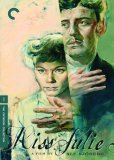| Reviews & Columns |
|
Reviews DVD TV on DVD Blu-ray 4K UHD International DVDs In Theaters Reviews by Studio Video Games Features Collector Series DVDs Easter Egg Database Interviews DVD Talk Radio Feature Articles Columns Anime Talk DVD Savant Horror DVDs The M.O.D. Squad Art House HD Talk Silent DVD
|
DVD Talk Forum |
|
|
| Resources |
|
DVD Price Search Customer Service #'s RCE Info Links |
|
Columns
|
|
|
Miss Julie - Criterion Collection
THE MOVIE:
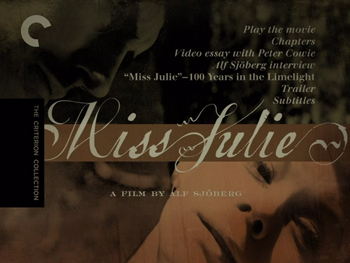
August Strindberg is an important figure in 20th-century theatre. The Swedish playwright's productions strove for a new sense of naturalism and explored the psychological landscape of the featured characters. His turn-of-the-century drama, Miss Julie, was scandalous not just because it dug at the marrow of injustice in social constructs and portrayed its titular heroine as having a potent sexuality, but also because Strindberg demanded real props be on stage and structured his script as one long scene without any act breaks. His effect on live drama in general, and Swedish theatre in particular, is still being felt today. Certainly there would have been no Ingmar Bergman without August Strindberg.
There were several film productions of Miss Julie before Alf Sjöberg's, but it was this 1951 production, now on DVD from Criterion, that finally allowed the conflicted socialite to make the transition from playhouse to movie house. Much like Bergman after him, Sjöberg had his hand in both worlds. (The two actually worked together once, with Sjöberg directing Bergman's screenplay Torment.) The director's film version of Miss Julie came on the heels of a successful stage revival he helmed. While such a connection often spelled trouble for filmed versions of stage plays, with the conventions of the traditional theatre translating to a stiff mis-en-scene in the newer art form, Sjöberg proved adept at both crafts, and thus understood what it took to make Miss Julie a successful film while also keeping Strindberg's meaning and artistry intact.
The whole of Miss Julie takes place over one night, during the midsummer festival when the Swedes celebrate the midnight sun and a full day of light. At a posh country estate, the servants play while the boss is way. The Count (Anders Henrikson) is celebrating elsewhere, only his daughter Julie (Anita Björk) remains. She is ready to dance and drink with the lower class, especially her handsome footman Jean (Ulf Palme). Jean is caught between his duty and his manhood, knowing with his brain that he needs to submit to his mistress' orders but desiring in his loins for her to submit to his. Jean is the object of many a girl's affection on the estate, but he is engaged to the cook, Kristin (Märta Dorff).
Strindberg's original play actually takes place entirely in the kitchen, as the strained triangle of Julie, Jean, and Kristin battle across social and sexual lines. Smartly, Sjöberg takes the action out of the house and restructures the story as a whirlpool of flirtation and memory. Moving at a feverish pace, the push and pull between Julie and Jean explores questions of social and class status, gender roles, and even the sincerity of the participants. Though there are a couple of instances where two lusty lovers succumb to their baser desires--first between servant girl Viola (Inga Gill) and the haunting farmhand (Max von Sydow), then between Julie and Jean, and more later with Viola, who gets around--there are far more emotional orgasms, with blood rushing to the head and igniting emotions, and then the flip of post-coital guilt as the blood rushes back, leaving Jean and Julie to deny everything they just said.
Not being constrained by time and space, Sjöberg is free to expand beyond the core cast (Sydow's role is invented for the film, serving as the peeping eye and guilty conscience of social convention) and also bring to life scenes of dialogue as honest-to-goodness flashbacks. Thus, we get extended sequences of a young Jean (Jan Hagerman) first seeing a young Julie (Inger Norberg), fomenting a love that burns through the years only to finally explode on this night. (He literally crawls out of the muck in order to first set eyes on her.) We also see the home life that fostered Julie's confused mental state. Her mother (Lissi Alandh) was a progressive feminist who turned the Count's farm upside-down, assigning masculine duties to the female servants and vice versa. Raising Julie as a boy, dressing her in boy clothes, she encouraged the daughter to break out of prescribed roles. When this experiment fails and Julie is yanked back into the lifestyle she was reared to reject, Mom is unable to let the issue rest, turning her husband into a cuckold and exacting a revenge that is still felt in the household.
Thus, Julie's confusion stems from her wanting to act on her yearnings but feeling there is punishment awaiting anyone who does. She indulges in petty displays of power that stand as substitutes for the sex she can only spy at through peepholes, feeling a mixture of arousal and disgust. I couldn't take my eyes of off Anita Björk during Miss Julie, not just because she's a beautiful actress, but she is so adept at creating an air of crazy all around her, I was afraid I would miss something. It's interesting to note that this is the same year that Vivien Leigh gave a similarly impressive performance as the similarly fractured Blanche DuBois in 1951's other big-screen stage adaptation, Elia Kazan's film translation of Tennessee Williams' A Streetcar Named Desire. While Ulf Palme is no Marlon Brando, there are macho parallels to be drawn between Jean the footman and Stanley Kowalski, both of whom persecute these woman for their lusty desires to the point of breaking them.
It's been a while since I've seen Streetcar, but I'd actually posit that Sjöberg is able to run a little more wild than Kazan. The open Swedish countryside and the ongoing, hazy state of near-twilight (photographed beautifully by Göran Strindberg, a descendant of August) creates a false feeling of passion and freedom in Julie, making it all the more stifling when she must return to the house, the kitchen, and her old life. Blanche DuBois can never quite break through those walls, and thus the release experienced at the close of the Williams play is one of further confinement. Arguably, Julie's last act of the Strindberg play finally gets her off of daddy's plantation.
Then again, based on your point of view, she may be trading one restrictive life for another. It all depends on what you believe comes after....
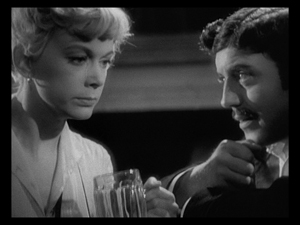
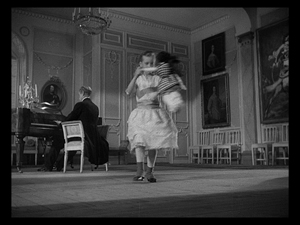
THE DVD
Video:
Criterion presents Miss Julie in its original full-frame 1.33:1 aspect ratio, picture boxed so that on widescreen TVs there will be black lines on all four sides. The black-and-white image is mostly good, but not free of problems. A pair of lines that run down the screen reoccur regularly, and there is often a haziness over the picture that looks like a problem with the source rather than an intentional fogging. The values of the blacks are pretty good, though, and the details sharp.
Sound:
The original Swedish soundtrack is mixed in mono, and I didn't notice any problem here. The sound is always clear, and the subtitles easy to read.
Extras:
In lieu of an audio commentary, historian Peter Cowie has put together a 33-minute video essay, using photographs, press material, and film clips to talk about the history of the play and its author, other permutations of Miss Julie on film, Alf Sjöberg, and this particular production. It's a good piece, very concise, as well as illuminating.
Selections from a 1966 interview with Sjöberg (running 6:40) feature the director talking about his film career and his theories about cinema. This is a more general overview, and not really Miss Julie specific at all. Yet, that doesn't really matter, as the topics covered shed light on his overall approach, which then informs our view of the movie.
The longest bonus is the 2006 Swedish television program Miss Julie: 100 Years in the Limelight. Built around a new performance of the play, the producers show footage from that staging while foraging through the legacy of the piece. Anita Björk is even featured in a contemporary interview.
Finally, Criterion includes the original theatrical trailer. There is also the usual accompanying booklet, full of photos, a chapter listing, and two new essays: Peter Matthews writing about Miss Julie and Birgitta Steene writing about August Strindberg. You also get to see the excellent cover painting by comics artist Kent Williams without any logo or design; Kent was also the artist for the graphic novel version of Darren Aronofsky's The Fountain.
FINAL THOUGHTS:
Alf Sjöberg's 1951 adaptation of the August Strindberg play still hums with a vibrant, manic potency. Given a new, twisty structure for film, Miss Julie jumps from the confines of the stage and becomes a lusty celluloid drama. In the lead role, Anita Björk is riveting, capturing the bizarre energy of a woman on the edge of her own sexuality and of her own mental stability. Photographed beautifully, this study of social and sexual politics still feels achingly relevant. Packaged with a few well-chosen extras, the Miss Julie - Criterion Collection DVD is Highly Recommended.
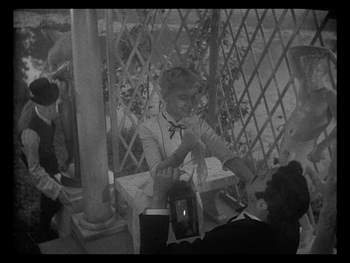
Jamie S. Rich is a novelist and comic book writer. He is best known for his collaborations with Joelle Jones, including the hardboiled crime comic book You Have Killed Me, the challenging romance 12 Reasons Why I Love Her, and the 2007 prose novel Have You Seen the Horizon Lately?, for which Jones did the cover. All three were published by Oni Press. His most recent projects include the futuristic romance A Boy and a Girl with Natalie Nourigat; Archer Coe and the Thousand Natural Shocks, a loopy crime tale drawn by Dan Christensen; and the horror miniseries Madame Frankenstein, a collaboration with Megan Levens. Follow Rich's blog at Confessions123.com.
|
| Popular Reviews |
| Sponsored Links |
|
|
| Sponsored Links |
|
|
| Release List | Reviews | Shop | Newsletter | Forum | DVD Giveaways | Blu-Ray | Advertise |
|
Copyright 2024 DVDTalk.com All Rights Reserved. Legal Info, Privacy Policy, Terms of Use,
Manage Preferences,
Your Privacy Choices | |||||||









